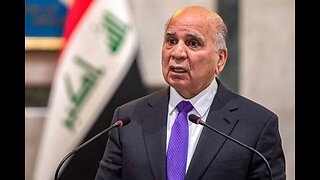Premium Only Content

Episode 2853: Overcoming Obstacles in Mental Prayer
Opening Prayer:
Heavenly Father, we come before You in humility, seeking to deepen our union with You through the practice of mental prayer. Enlighten our minds and inflame our hearts with love for You. Grant us the grace to persevere in prayer, to overcome distractions, and to trust in Your presence even when we feel distant. Through the intercession of the Blessed Virgin Mary, St. Teresa of Ávila, and all the saints who excelled in prayer, may we grow ever closer to You. We ask this through Christ our Lord. Amen.
________________________________________
As I prepare each day to pray before the Blessed Sacrament a couple things happen. First is just walking in an getting ready to pray, everything is flooding my mind either with a conversation I had or work I need to get done or things I’m seeing. I have to immediately get on my knees and call out to my guardian angel and ask him to assist me in clearing my mind so I can properly meditate on Christ and I mean really truly mediate on Christ and before I start ask Christ to please let me adore him properly and not robotically so this is what this one off episode is about, how do we delve into the transformative practice of mental prayer, a cornerstone of the Catholic spiritual life.
Now I will draw from the inspiration from a talk titled "Mental Prayer and Reasons People Don’t Advance," that is available on Sensus Fidelium, and I will explore its significance, common obstacles, and practical solutions. We’ll also reflect on insights from saints and theologians who have guided the faithful in cultivating a life of deep, meditative prayer.
Before beginning in this episode I want to tell you I was getting ready to start my day and so I usually start with “Speak Lord for Your Servant is Listing” and then I will start writing my morning episode even before taking a shower and heading off to EA. I must start EA first thing in the morning or I will certainly get distracted once my day gets started. I know many who say this is when the get their exercise in, well physical health is good but I choose to focus on my spriritual health first. Sorry I digress, so as I am writing my morning episodes I usually listen to a talk by certain priests or catholic scholars and this morning I started to listen to a talk by a priest in which he discussed the concept of managing our lower, animal instincts to cultivate our spiritual instincts, a theme deeply rooted in traditional Catholic teaching. He explained that the human person is composed of body and soul, with the soul being oriented toward God and the body possessing instincts inherited from our fallen nature.
These instincts such as the desires for comfort, pleasure, and avoidance of effort are not inherently evil but must be subordinated to reason and grace. If left unchecked, they can dominate our will, making it difficult to engage in mental prayer or any spiritual practice.
The priest emphasized the following points:
The Role of Animal Instincts
• Distractions and the Flesh: The priest noted that distractions during mental prayer often arise from these instincts. For example, the mind may wander to trivial matters, or we might feel restless and uncomfortable while attempting to focus on God.
• Disorder from Original Sin: Due to the effects of Original Sin, our animal instincts naturally seek gratification without regard for higher spiritual goals. This inclination, known as concupiscence, must be tempered through discipline and grace.
Cultivating Spiritual Instincts
• The Higher Calling of the Soul: The priest explained that our spiritual instincts faith, hope, and charity are the faculties that enable us to connect with God. These instincts are strengthened through prayer, the sacraments, and mortification of the flesh.
• Detachment from Sensual Comforts: He stressed the importance of practicing detachment, saying that a person overly attached to bodily comforts will find it difficult to persevere in the discipline required for mental prayer.
Practical Advice to Control Instincts
• Mortification: The priest encouraged the faithful to engage in small acts of self-denial to train the body to submit to the soul. For instance, fasting or choosing discomfort in small matters can help cultivate self-mastery.
• Consistent Effort: He likened spiritual growth to training an unruly animal. Just as a wild horse must be tamed through repeated efforts, so must our lower instincts be brought under control through regular and disciplined practice of prayer.
• Prayer and Grace: Ultimately, victory over these instincts is not achieved by sheer human effort but through reliance on God’s grace. Prayer, particularly mental prayer, invites God to transform us from within and reorder our desires.
The Saints on This Struggle
The priest drew on insights from the saints to reinforce this teaching:
• St. Paul’s Struggle in Romans 7:23: “I see another law in my members, warring against the law of my mind.” This passage illustrates the internal battle between the desires of the flesh and the aspirations of the spirit.
• St. John of the Cross: He taught that the journey toward union with God involves the “dark night,” where the soul is purified from attachment to worldly and bodily instincts to achieve spiritual freedom.
• St. Thomas Aquinas: The Angelic Doctor explained that virtue is achieved when reason governs the passions, aligning the whole person toward the ultimate good, which is God.
Encouragement and Hope
The priest concluded by reminding the faithful that while the struggle between the animal and spiritual instincts can be intense, it is part of the path to holiness. He emphasized that every effort made to control these instincts and engage in mental prayer, no matter how imperfect, is pleasing to God and contributes to our sanctification.
By focusing on grace, perseverance, and the example of the saints, we can overcome these obstacles and tap into our spiritual instincts, ultimately growing closer to God.
Trust me when I tell you that as you build your meditative and spiritual life you will naturally start moving other things out to make even more room for more and you will get a sense of clarity that can only come from Christ. You will rush to get back into union with him because he will pour out more graces for you to do so.
________________________________________
Segment 1: The Essence of Mental Prayer
Mental prayer, often referred to as meditation, is the soul’s intimate dialogue with God. St. Teresa of Ávila, a Doctor of the Church, describes mental prayer as “nothing else than a close sharing between friends; it means taking time frequently to be alone with Him who we know loves us.” This deeply personal practice is not about reciting words but engaging the heart and mind in a loving conversation with God. It is a time to pour out our thoughts, fears, and hopes, while also listening to His gentle whispers in the silence of our hearts.
Mental prayer allows us to reflect on God’s Word, His love, and His will for our lives, drawing us into deeper communion with Him. The Catechism of the Catholic Church (CCC 2709) highlights this practice as a quest for "the God whom my soul loves" (Song of Songs 1:7), emphasizing that mental prayer is not only a form of communication but also an act of seeking and loving God.
St. Francis de Sales describes mental prayer as the "spiritual sugar of the soul," nourishing and sweetening our relationship with God. Similarly, St. Alphonsus Liguori encourages the faithful to persevere in this practice, stating, "Those who pray are certainly saved; those who do not pray are certainly damned."
However, as the priest in the Sensus Fidelium talk notes, many struggle to advance in mental prayer due to various challenges. Distractions, impatience, and lack of consistency often plague even the most devout practitioners. Despite these difficulties, the saints assure us that perseverance in mental prayer is essential for spiritual growth. By creating a regular habit of prayer and entrusting our weaknesses to God, we can overcome these hurdles and experience the transformative power of His presence.________________________________________
Segment 2: Common Obstacles in Mental Prayer
1. Lack of Consistency:
St. Francis de Sales warns, “Many would be saints if they were not only a quarter of an hour at prayer.” Infrequent or irregular prayer habits can hinder our spiritual growth. Just as a relationship requires regular communication to thrive, so too does our relationship with God.
The priest emphasizes that consistency is the foundation of any successful prayer life. Inconsistency, such as praying sporadically or only in times of crisis, hinders spiritual growth. He warns that mental prayer is not optional for those striving for holiness it is essential.
Quoting St. Alphonsus Liguori, the priest reminds us: “He who prays is saved; he who does not pray is damned.” While this might sound severe, it underscores the absolute necessity of prayer for maintaining a relationship with God.
To build consistency, the priest recommends:
• Set a regular time and place: Choose a time when you are least distracted, whether it’s early morning or evening, and designate a quiet, sacred space for prayer.
• Start small: Even 15 minutes a day can yield immense spiritual benefits if done faithfully.
• Create a habit: Treat mental prayer as non-negotiable, much like meals or physical exercise. Over time, it will become a natural part of your daily routine.
2. Distractions:
St. John Vianney reminds us, “We must not be discouraged by our distractions but humbly present them to God.” Distractions are natural, but we must gently refocus our attention on the Lord.
The priest explains that distractions are a universal obstacle in mental prayer. He likens the wandering mind to an unruly child that must be gently but firmly brought back to focus. The source of distractions often stems from our preoccupations with daily life, excessive attachments to material concerns, or even spiritual pride.
He advises:
• Acknowledge distractions without frustration: Recognize them and calmly redirect your attention to God.
• Invoke God’s help: Say a short prayer, such as “Jesus, help me focus,” or call on the Holy Spirit for guidance.
• Prepare beforehand: Spend a few moments quieting your mind and heart before beginning prayer. This could include slow, meditative breathing or repeating a simple phrase like “Lord, I am here.”
• Use holy imagery or Scripture: Having a visual or textual focus, such as an image of Christ or a favorite verse, can help refocus attention when the mind begins to wander.
St. Francis de Sales advises in these moments: “If all you do in prayer is bring your heart back a thousand times, though it went away every time, your prayer is very well made.”
3. Impatience:
Expecting immediate spiritual consolations can lead to discouragement. St. John of the Cross teaches that God often allows us to experience dryness in prayer to purify our intentions and deepen our trust in Him.
The priest highlights the human tendency to seek quick results. We live in a world that values efficiency and measurable outcomes, and this mindset can seep into our spiritual practices. When consolations are absent, or when progress seems slow, impatience can take root, leading to discouragement or even abandonment of mental prayer.
He emphasizes that mental prayer is not about immediate feelings or dramatic revelations. Instead, it is a steady act of love and faith, often requiring us to pray through dryness or difficulty. The priest quotes St. John of the Cross: “The soul that is united to God is not the one who enjoys the most consolations, but the one who perseveres in aridity with love.”
Practical advice includes:
• Accept dryness as part of God’s plan: Understand that spiritual dryness can purify your intentions and deepen trust in God’s presence.
• Focus on faithfulness, not feelings: Spiritual growth is often imperceptible, like the slow growth of a seed underground.
• Offer your struggles to God: View the difficulty in prayer as a sacrifice pleasing to Him.
4. Insufficient Preparation:
Entering prayer without reflection can lead to superficial engagement. St. Ignatius of Loyola encourages beginning prayer with a moment of preparation, placing ourselves in God’s presence and recalling His infinite love for us.
5. Neglect of Spiritual Reading:
Failing to nourish our minds with spiritual texts can limit the depth of our meditation. St. Alphonsus Liguori advises, “Without meditation, the soul is without light.” Spiritual reading illuminates the truths of faith and inspires our prayer.
________________________________________
Segment 3: Practical Solutions for Growth
The priest offers several strategies to overcome these challenges:
• Regular Schedule: Dedicate a consistent time each day for mental prayer. Early mornings or evenings are often ideal for quiet reflection.
• Create a Prayerful Environment: Choose a space free from distractions, perhaps adorned with sacred images or a crucifix.
• Patience and Perseverance: Trust that God is working in your soul, even if you don’t feel His presence.
• Preparation: Begin with a moment of recollection, invoking the Holy Spirit to guide your prayer.
• Incorporate Spiritual Reading: Use Scripture, writings of the saints, or meditations to inspire and guide your reflections.
________________________________________
Segment 4: Testimonies from the Saints
St. Teresa of Ávila emphasizes perseverance: “Never give up prayer, and should you find dryness and difficulty, persevere in it for this very reason.” Similarly, St. Thérèse of Lisieux shares, “For me, prayer is a surge of the heart; it is a simple look turned toward heaven, it is a cry of recognition and of love, embracing both trial and joy.”
The Role of the Saints in Overcoming Challenges
The priest repeatedly emphasizes the encouragement offered by the saints. St. Teresa of Ávila urges us: “Never give up prayer, and should you find dryness and difficulty, persevere in it for this very reason.” She assures us that even amidst struggles, God is drawing us closer to Him, often in ways we cannot perceive.
St. Thérèse of Lisieux echoes this sentiment, describing her own experiences with distractions and dryness. “Sometimes when I am in such a state of spiritual dryness that not a single good thought occurs to me, I say very slowly the ‘Our Father’ or the ‘Hail Mary,’ and these prayers suffice to take me out of myself.”
The priest concludes this section by reminding us that prayer is not a solitary endeavor; it is always aided by grace. While human effort is required to form the habit and persevere through difficulties, it is ultimately God who works in us. By entrusting our weaknesses to Him, we open ourselves to His transformative power.
He encourages the faithful to:
• Rely on God’s strength: Pray for the grace to pray well, asking for perseverance and humility.
• Seek the intercession of Mary: As the perfect model of prayer, the Blessed Virgin Mary can guide us in our efforts to draw closer to her Son.
• Persevere with trust: Trust that every moment spent in mental prayer, no matter how imperfect, is pleasing to God and beneficial for our souls.
As the priest beautifully states: “God desires your effort, not your perfection. He delights in every sincere attempt to draw near to Him.”
________________________________________
By addressing these struggles and embracing the practical wisdom of the saints, we can deepen our practice of mental prayer. It is through perseverance, even in the face of difficulties, that we experience the transformative power of God’s presence and grow in holiness.
________________________________________
Conclusion:
Mental prayer is a journey of the soul toward God. By addressing obstacles and implementing practical solutions, we can deepen our relationship with Him. Let us take inspiration from the saints and commit ourselves to this sacred practice, trusting in God’s grace to sustain us.
________________________________________
Closing Prayer:
Almighty God, we thank You for the gift of prayer, which allows us to commune with You. Strengthen our resolve to persevere in mental prayer, overcoming all obstacles with the help of Your grace. Through the intercession of the saints, may we grow in love, humility, and faith. Keep us steadfast in our journey toward holiness, and bring us to the joy of eternal union with You. Through Christ our Lord. Amen.
-
 LIVE
LIVE
RiftTV/Slightly Offensive
1 hour agoBabylon Bee Mocks Christianity in Con Inc War on "Christ is King" | Guest: Pastor Joel Webbon
788 watching -
 34:43
34:43
Stephen Gardner
1 hour ago🚨Trump Lawyer makes TWO HUGE ANNOUNCEMENTS | Benny Johnson
1.16K11 -
 DVR
DVR
Robert Gouveia
3 hours agoJudge BLOCKS Proof-of-Citizenship! Trump BACK to Supreme Court! Deportee Discovery STAYED!
4.9K11 -
 LIVE
LIVE
MyronGainesX
17 hours ago $5.77 earnedCollege Debate Reaction, Jordan Peterson Sells Out, Shannon Sharpe Shakedown!
2,222 watching -
 1:33:35
1:33:35
theoriginalmarkz
2 hours agoEvening News with MarkZ, joined by Jonathan Otto. 04/24/2025
5.09K3 -
 10:10
10:10
Mrgunsngear
2 hours agoNew Trijicon MRO SD - The Best American Made Red Dot Optic?
3052 -
 LIVE
LIVE
Game On!
11 hours ago2025 NFL Draft Live Coverage and Reaction!
262 watching -
 LIVE
LIVE
RamrodJenkins
3 hours agoOblivion Remastered! I am so excited to finally play this!
39 watching -
 LIVE
LIVE
Tommy's Podcast
1 hour agoE713: Lady Luck
97 watching -
 12:19
12:19
T-SPLY
7 hours agoDemocrats Start Economic War With El Salvador!
12K17